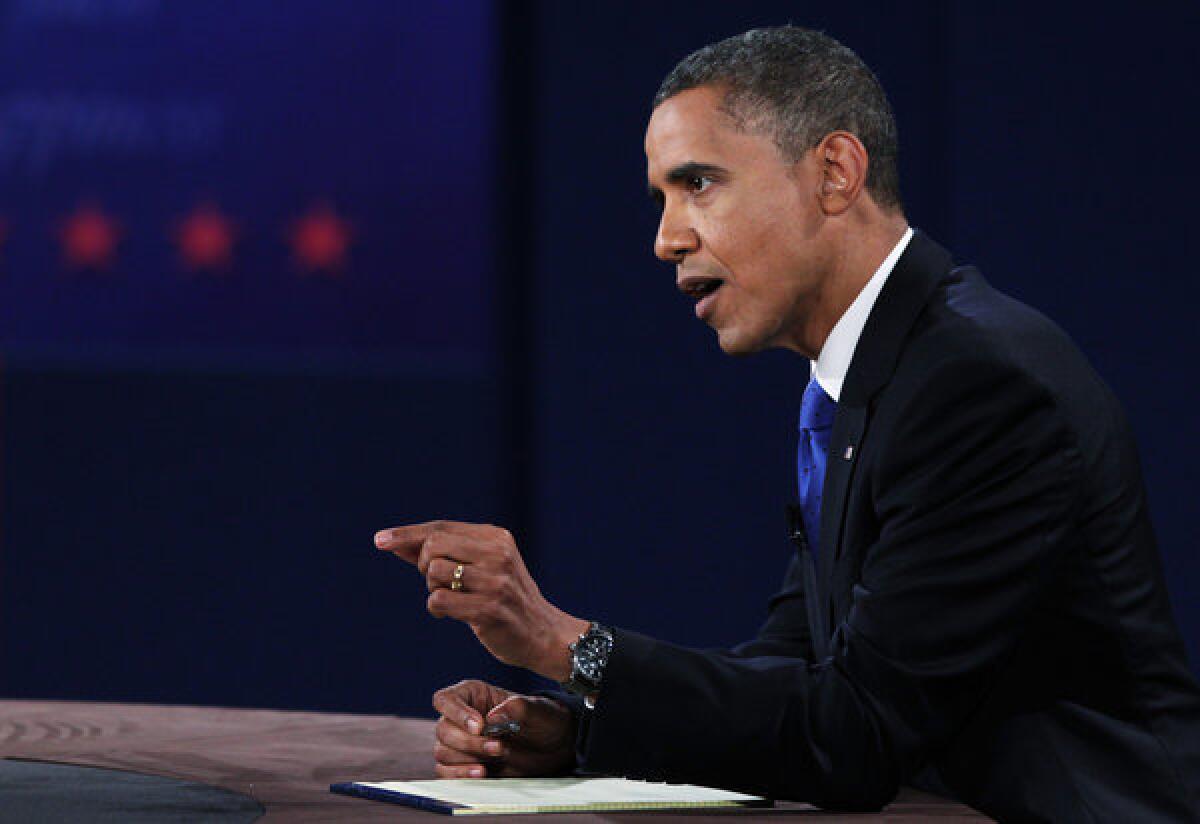Detroit, not foreign policy, was key dispute in debate

- Share via
WASHINGTON — In a presidential debate that was supposed to focus on foreign policy, the most contentious dispute over who was telling the truth was the exchange between President Obama and Mitt Romney over Detroit.
“You know, if we had taken your advice, Gov. Romney, about our auto industry, we’d be buying cars from China instead of selling cars to China,” Obama said, touting his role in the financial bailout of General Motors and Chrysler, which began under the George W. Bush administration in late 2008.
In an opinion article in November 2008, Romney urged the government, as the headline said, to “Let Detroit Go Bankrupt.”
PHOTOS: Memorable presidential debate moments
“A managed bankruptcy may be the only path to the fundamental restructuring the industry needs,” Romney wrote. “The federal government should provide guarantees for post-bankruptcy financing and assure car buyers that their warranties are not at risk.”
A managed bankruptcy is quicker and less chaotic than a regular bankruptcy and allows a company to restructure its operations to make it stronger when it emerges from the process. The dispute in the debate boils down to whether a managed bankruptcy for General Motors and Chrysler would have been possible at the time without the government providing approximately $80 billion in financing to keep the companies running during the process.
Romney said Monday night that he had not advocated allowing General Motors and Chrysler to go out of business.
“I was born in Detroit. My dad was head of a car company. I like American cars. And I would do nothing to hurt the U.S. auto industry,” he said. “My plan to get the industry on its feet when it was in real trouble was not to start writing checks. … I said they need — these companies need to go through a managed bankruptcy, and in that process they can get government help and government guarantees, but they need to go through bankruptcy to get rid of excess cost and the debt burden that they’d built up.”
Obama accused Romney of trying to “airbrush history.”
“You were very clear that you would not provide government assistance to the U.S. auto companies even if they went through bankruptcy,” Obama said. “You said that they could get it in the private marketplace. That wasn’t true.”
The bipartisan Congressional Oversight Panel, the government-appointed watchdog for the $700-billion Troubled Asset Relief Program, backs Obama on this. It said in a January 2011 report that private financing was not available for General Motors and Chrysler in late 2008.
There was less need for fact-checking on many other issues, particularly on foreign policy.
They agreed, with some quibbles, on the need for economic sanctions against Iran, U.S. reluctance to intervene militarily in Syria, sending drone aircraft to kill suspected terrorists, the need for Hosni Mubarak to step down as president of Egypt last year, the importance of Israel as an ally — and more.
Obama challenged Romney’s recent statement that he supports helping Syrian insurgents obtain heavy weapons in the civil war against Bashar Assad’s government. The Obama administration has helped Arab allies choose Syrian rebel groups to arm, but it has opposed providing heavier anti-aircraft and anti-tank weapons, fearing they might fall into the hands of extremists.
Romney said his administration would be careful about which groups would receive the weapons. He hasn’t specified which weapons he would provide, or if they would include shoulder-mounted anti-aircraft weapons.
INTERACTIVE: Battleground states map
As in previous debates, Romney referred to the education system in Massachusetts as No. 1 in the nation. On Monday, he referred, in particular, to fourth and eighth graders ranking at the top.
Student achievement in Massachusetts is arguably first in the country based on the National Assessment of Educational Progress, a test given to a sample of students nationwide. Massachusetts also has been praised for its rigorous academic standards.
Significant education initiatives in Massachusetts began in the early 1990s, about a decade before Romney became governor — a point that Obama briefly tried to insert in the debate.
Massachusetts’ solid reputation in education was in place before, during and after Romney’s term.
Ken Dilanian, Shashank Bengali, Neela Banerjee, Howard Blume and Mitchell Landsberg contributed to this report.
More to Read
Sign up for Essential California
The most important California stories and recommendations in your inbox every morning.
You may occasionally receive promotional content from the Los Angeles Times.











